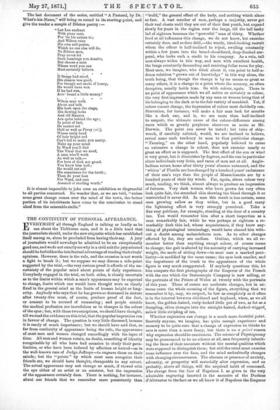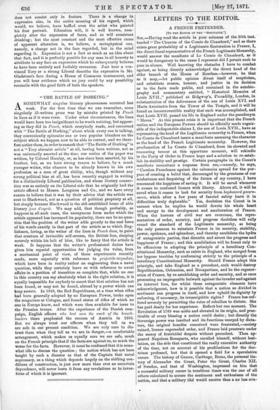THE CONTINUITY OF PERSONAL APPEARANCE. lEIVERYBODY all through England is
talking as loudly as he 11( can about the Tichborne case, and it is a little hard that the journalists should, under the new etiquette which has established itself among us, alone be precluded from having their say. A jury of journalists would nowadays be admitted to be an exceptionally good one, and wedo not exactly see why in a civil suit the jurysele,cted should be forbidden the intellectual advantage of reading their rivals' opinions. However, there is the rule, and the occasion is not worth a fight to break it ; but we suppose we may discuss a side-point suggested by the trial,—the very curious proof it affords of the un- certainty of the popular mind about points of daily experience. Everybody engaged in the trial, on both sides, is clearly uncertain as to the limits within which a man's appearance may be expected to change, limits which one would have thought were as clearly fixed in the general mind as the limits of human height or long- evity. Anybody who says that he has grown or decreased in stature after twenty-five must, of course, produce proof of the fact, or consent to be accused of romancing ; and people outside the medical profession are incredulous as to changes in the colour of the eyes ; bat, with those two exceptions, we should have thought, till we read the evidence on this trial, that the popular impression ran in favour of change. The question is very little discussed, because it is rarely of much importance; but we should have said that, so far from continuity of appearance being the rule, the appearance of most men and women changed exceedingly with the lapse of time. All men and women retain, no doubt, something of identity recognizable by all who have had occasion to study their pecu- liarities, or who have been induced by affection or hatred—as in the well-known case of Judge Jeffreys—to engrave them on their minds ; but the " points " by which most men recognize their friends are, we should have thought, changeable to any extent. The actual appearance may not change so much, if viewed with the eye either of an artist or an amateur, but the impression of the appearance certainly does. There is nothing, for instance, about our friends that we remember more persistently than "build," the general effect of the body, and nothing which alters so fast. A vast number of men, perhaps a majority, never get their real chests until they are out of their first youth, but expand slowly for years in the region over the lungs, till the tall lanky lad of eighteen becomes the "powerful" man of thirty. Whether food at all influences this change, we do not know, but exercise certainly does, and so does drill,—the weedy, tired-looking recruit whom the officer is half-inclined to reject, swelling constantly within a few years into the broad-shouldered, deep-flanked cor- poral, who looks such a credit to his company. As a rule, tall men always widen in this way, and men with excellent health, the lungs constantly demanding and receiving fuller room for play. Most men, we imagine, who think about it, can point to half-a- dozen relatives "grown out of knowledge" in this way alone, the truth being, that though the change is by no means so great as many others, it is a change in a point where the memory, so often deceptive, usually holds true. So with colour, again. There is no point of appearance which we all notice so certainly as colour, the very first impression made by any man or woman being that of his belonging to the dark or to the fair variety of mankind. Yet, if colour cannot change, the impression of colour most decidedly can. Starvation, for instance, will make a fair man look for months like a dark one, and is, we are more than half-inclined to suspect, the ultimate cause of the colour-difference among races which so greatly perplexes observers as acute as Mr. Darwin. The point can never be tested ; but tales of ship- wreck, if carefully collated, would, we are inclined to believe, reveal some such tendency in man to that particular change. "Tanning," on the other hand, popularly believed to cause so extensive a change in colour, does not exercise nearly so great an effect as is supposed. The first effect of the sun or wind is very great, but it diminishes by degrees, and the sun in particular alters individuals very little, and races of men not at all. Anglo- Indians return home after thirty years' absence untanned, and the ' whites ' of Florida are less changed by a hundred years' endurance of their sun's rays than the people of Massachusetts are by a hundred years of their dry winds. Fat, again, alters colour very much, tending, we think, almost always to produce an impression of fairness. Very dark women who have grown fat very often look quite fair, the stretched skin showing the blood through it as unstretched it never did. In men this result is less certain, some men growing sallow as they widen, but in a good many the lightening effect is very strongly perceived. Take a fine rosy publican, for example, standing at the door of a country. inn. You would remember him after a short inspection as a man remarkably fair, while he was perhaps at eighteen a re- markably dark thin lad, whose acquaintance, if they knew any- thing of physiological terminology, would have classed him with- out a doubt among melanchthous men. As to other changes effected by fat, they are endless. Outline, which we all re- member better than anything except colour, of course seems to change; the gait is altered by the necessity of carrying increased weight, the mode of sitting down—in most men a marked pecu- liarity—is modified by the same cause; the eyes look smaller, and the importance of the trunk to the appearance of the whole figure is very much exaggerated. If anybody questions this, let him compare the first photographs of the Emperor of the French with the one which the Stereoscopic Company is now selling, or the portraits of the Prince of Wales at twenty with the portraits of this year. Those of course are moderate changes, but in ex- treme cases the whole meaning of the figure, everything that we remember it by, may, we suspect, be lost as completely as it often is in the interval between childhood and boyhood, when, as we all know, the golden-haired, curly-locked little pet of two, as fat as a dumpling, often changes into the straight-haired, darked-wigged, sallow little stripling of ten. • Whether expression can change is a much more doubtful point. Scarcely anyone, we imagine, has quite enough experience and memory to be quite sure that a change of expression he thinks he sees is more than a mere fancy, but there is no a priori reason why expression should be continuous. The science of Physiognomy may be pronounced to be no science at all, men frequently inherit- ing the faces of their ancestors without the mental qualities which were supposed to distinguish them; but still the mind must exercise some influence over the face, and the mind undoubtedly changes with changing circumstances. The absence or presence of anxiety, adversity, or prosperity will materially alter expression, and so probably, above all things, will the acquired habit of command. The change from the face of Napoleon I. as given in the very admirable engraving inserted in the memoirs of the Duchess d'Abtrantes to the face as we all know it of Napoleon the Emperor
does not consist only in feature. There is a change in expression also, in the entire meaning of his regard, which would, we believe, have baffled even the artist who painted
his first portrait. Education will, it is well known, com- pletely alter the expression of faces, and so will consistent drinking ; but the most constant and the most effective cause of apparent alteration is, we believe, a metaphysical one, namely, a change not in the face regarded, but in the mind regarding it. Expression is not a fact so much as an idea about that fact, and it is perfectly possible for any man in all honesty to attribute to any face an expression which he subsequently believes to have been entirely and foolishly erroneous. Just hear a con- vinced Tory or a strong Liberal describe the expression in Mr. Gladstone's face during a House of Commons tournament, and you will hear evidence which no jury could by any possibility reconcile with the good faith of both the speakers.



































 Previous page
Previous page